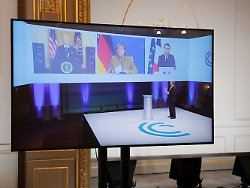Friday 19th February 2021
Moscow and Beijing
The west is going on a more confrontational course
The US and the EU are tightening their tone towards Russia and Moscow. From Brussels it is said that times are getting less comfortable. US President Biden castigates the attacks on democracy. Chancellor Merkel also makes it clear that the world would no longer work without China.
The West wants to readjust its relationship with countries like Russia and China after the change of power in the White House. US President Joe Biden, Chancellor Angela Merkel and the leaders of the EU spoke out in favor of close coordination and a joint approach at the Munich Security Conference. According to EU Council President Charles Michel, Russia, China and Iran will have to prepare for more uncomfortable times. The alliance of the EU, the US and like-minded partners is once again "a tremendous and influential power," he said.
Biden described Russia as a threat to Western democracies. "The Kremlin is attacking our democracies and institutions," he said. Russia's head of state Vladimir Putin wants to weaken European projects and undermine the transatlantic partnership. At the same time, Biden warned against a return to a "block world like in the Cold War". Both in Europe and in the USA, democratic progress is "under attack", said Biden and spoke of a "crossroads". It is now up to the West to prove "that our model is not a relic of history". With a view to China, Biden predicted that the competition would be intense. "We can win this race for the future."
Merkel: Transatlantic Russia Agenda
Chancellor Merkel offered Biden close cooperation on the strategic challenges. "There is a lot to be done. Germany is ready for a new chapter in the transatlantic partnership," she said. "It won't always be equal interests. I have no illusions about that." One must also speak openly about differences. But from the value base and the conviction that democracy is capable of acting, "we have a broad, good common foundation".
Merkel complained that no progress had been made in recent years with regard to Ukraine's sovereignty and territorial integrity. "Russia repeatedly involves member states of the European Union in hybrid disputes." That is why it is important to develop a common transatlantic Russia agenda. On the one hand, this must make cooperative offers, but also clearly identify the differences.
Perhaps it is even more complicated to develop a common agenda towards China. Beijing is a systemic competitor, and at the same time China is needed to solve global problems such as climate protection or biodiversity. China has gained global clout. "As a transatlantic alliance and as the world's democracies, we have to counter this with action."
EU Commission President Ursula von der Leyen also emphasized the importance of transatlantic cooperation in dealing with China and Russia. "An increasingly self-confident China showed robust economic growth in 2020 – despite the pandemic," she said. And an increasingly contradictory Russia continues to violate international rules at home and abroad. It is now a matter of Europe and the USA proceeding "shoulder to shoulder" again. "Because if we go ahead, it's not just about pooling strengths. That is a signal to the world."
.
